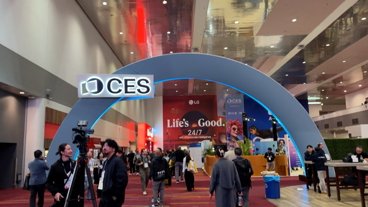A recent and controversial proposal by Democrats to purchase iPods for every schoolchild in Michigan may have been partially influenced by lobbying funds supplied by Apple, the Detroit Free Press is reporting.
The trip, which was reportedly funded in part by Apple, led to a $36 million proposal by Dillon last week to provide all Michigan students with iPods that they could use to download lectures and educational materials.
Representatives for Dillon did not provide details on the trip or say whether Apple paid for all or part of it, but Gillard is reported to have expressed his belief that the iPod maker covered at least a portion of the costs.
In statement to the media Tuesday evening, Dillon defended the trip by saying he was "one of several lawmakers to take this trip" and was now more "convinced than ever that the future for our children lies in education."
"As we move to the technology age and the knowledge-based economy, it would be irresponsible to separate technology from our K-12 system," he said. "I have four children, and I see how powerful technology is in their learning experience. While I believe that moving our classrooms into the 21st Century is critical to the future of our children and this state, I fully understand that unless and until we solve the state's fiscal crisis we cannot pursue this initiative."
Critics of the proposal have insinuated that policymakers are out of touch with Michigan's $600-million budget shortfall and the state's depressed economic conditions. They also view the iPod as less of an educational tool than a form of entertainment.
For his part, Gillard also defended the iPod proposal and the trip, arguing that lawmakers spent more time on non-Apple business, discussing such issues as wine distribution and Michigan business taxes. A spokesman for Dillon pointed out that similar trips have been taken in past years by other lawmakers, including many Republicans.
Matt Resch, a spokesman for the Republican leader in the House, said he believed the statement regarding Republicans was true. However, he was quick to add that those trips were never followed by the kind of proposal unveiled by the Democratic leadership to buy $36 million worth of Apple products.
 AppleInsider Staff
AppleInsider Staff






-m.jpg)






 William Gallagher
William Gallagher
 Charles Martin
Charles Martin
 Wesley Hilliard
Wesley Hilliard
 Amber Neely
Amber Neely
 Christine McKee
Christine McKee
 Marko Zivkovic
Marko Zivkovic
 Malcolm Owen
Malcolm Owen
 Oliver Haslam
Oliver Haslam






28 Comments
I can't see how they were ever going to manage to buy 1.65 million ipods for 36 million dollars AND buy things like computers and other equipment that the 36 million dollars was apparently set aside for.
It doesn't take toooo much skill at mathematical wizardry like "division" to work that little gem out.
Nothing to see here, this is a non-story cooked up by someone who wants media attention, move along, please.
I love seeing leaders so fiscally responsible.
Simple solution to the question of ethics -- if there is a legitimate government interest in politicians making these trips, then it should be the government that pays for them.
This has already been debunked.
It's a short article, but it gets straight to the point:
http://www.woodtv.com/Global/story.asp?S=6345567
Let's take a look at that last sentence. $38 million divided by 1.65 million students = $23 apiece. Even assuming that the entire $38 million went towards nothing but iPods (as opposed to other technology purchases), even the lowest-priced iPod (the Shuffle) costs $79 apiece. Granted, Apple would certainly give a large bulk purchase discount, but I can't imagine that they would've cut the price by over 70% on hardware (software is different, of course).
Of course, once the meme gets into the public eye, it becomes ideal fodder for the the media to rip into, true or not.
The Democratic leadership evidently DIDN'T propose to buy $36 million (or was it $38 million? The Free Press somehow lost $2 million between the first story and the second one...) worth of Apple products.
My guess is that it actually played out something like this:
The larger point? DISCUSSING an idea (even if it's a bad one) is hardly the same thing as making that idea part of a FORMAL PROPOSAL, and the Free Press ought to know better.
Simple solution to the question of ethics -- if there is a legitimate government interest in politicians making these trips, then it should be the government that pays for them.
Nice. Anything could be called "legitimate" with even a half-hearted argument, but guess who still gets stuck with the bill?